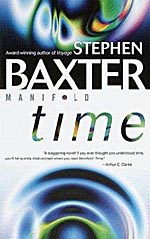
![]() Triseult
Triseult
3/24/2012
![]()
Stephen Baxter has been crowned by many as the modern king of hard science fiction. It's no coincidence that he has collaborated with Arthur C. Clarke on some novels, because his works share a lot of qualities and flaws. That is not to say his novels are not original and inventive: even Clarke himself never dreamed of the immensity of scope that Baxter weaved into Manifold: Time.
Manifold: Time opens up innocently enough, with an ex-astronaut-turned-CEO trying to launch a venture into space to mine near-Earth asteroids. Fairly quickly, however, the novel throws a curveball, and the joyride begins: soon enough, you'll be reading all about sending radio signals back in time, statistical predictions of the end of Humanity, the heat death of the Universe, and phase change of the void.
If this all sounds like a hard read, well, it is. I would not recommend Manifold: Time to anyone who is not deeply into SF, and who doesn't have at least a layman's interest in cosmology and astrophysics. If you are capable of overlooking the sometimes dry prose of, say, Azimov and Clarke, and still get a kick out of their awesome speculative concepts, then you will be more than rewarded by Baxter's novel. As a matter of fact, Manifold: Time is sure to delight and surprise even the most jaded hard SF reader.
There's one sequence in particular in Manifold: Time that will just blow your mind. I won't spoil it here, other than to say it involves visions of the far future. And when I say far, I mean far: to my knowledge, I've never seen a SF novel that dared go that far into the future. The result is a vertigo-inducing thrill ride, and on the strength of it alone, I heartily recommend this novel.
I already mentioned the thin characters and average writing, but since they're not the focus of this book, I hesitate to criticize them too much. I'm a huge fan of well-crafted stories and characters, so it did annoy me throughout the book. Characters are vaguely defined, and you can tell the book is written by an engineer. In Baxter books where the core concepts are so-so (Exultant), it's enough to make me put the book down. In his stronger works (Coalescent), it's a minor obstacle. In Manifold: Time, possibly his strongest book to date, it's a minor irritant you'll most likely learn to overlook by page 50.
It's worth noting that Manifold: Time is the first of a trilogy, composed of Manifold: Space and Manifold: Origin. These two sequels do not take place after Manifold: Time, but rather in separate universes. As such, the first novel stands up perfectly well on its own. The next two books are said to be of lesser quality, but this shouldn't prevent you from picking up Manifold: Time, and enjoy its mental joyride of truly cosmic proportions.